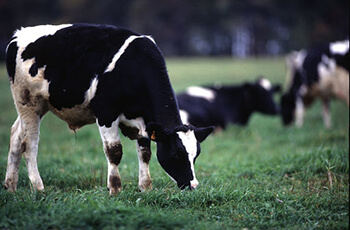Improve pastures with summer annuals
Mar 30, 2020

You may have heard the saying that grass is the best weed control, and it’s a true statement — provided the pastures and hayfields have a high population of desired grasses.
What if your pastures and hayfields don’t have that high population of grass? Planting summer annuals such as sorghum-sudan, teff, and crabgrass is a great option for renovating or managing pastures.
However, there are two important steps before planting: 1) address fertility as soon as possible and 2) spray with glyphosate to completely remove all weeds and grasses.
Address pasture and hayfield fertility
A healthy pasture always begins with good fertility including proper levels of pH, nitrogen, phosphorus, potassium, as well as minor elements. Livestock producers may be tempted to not give this step the attention it deserves because about 80-90 percent of the phosphorus and potassium is returned to the ground through manure. However, those deposits are mostly under shade trees and around water, hay rings, and mineral feeders. So, unless you are gathering all of the manure, spreading it across the pastures, and then dragging them, those returned nutrients are not fully benefiting the soil. That’s why soil sampling is crucial, and nutrient loss should be based on forage removal.
Spray to remove weeds and undesired grasses
Fertility is a key component of weed control because when nutrients are compromised, grasses die and are replaced with deep-rooted weeds. However, drought and overgrazing can also cause desired grasses to die out, resulting in pastures and hay fields covered in weeds. This is an opportunity to spray with glyphosate to take out all weeds and undesirable grasses and to plant summer annuals.
Plant summer annuals
Planting a summer annual in late spring or early summer is a wise choice for our region. Cool season grasses planted now will most likely not be able to establish a root system strong enough to live through the Mid South’s hot summer months.
Follow up with another spraying in late summer
When the production cycle of the summer annuals begins to wane, spray your pastures again with glyphosate. This follow-up step provides a much cleaner area to reseed cool season forages like fescue or orchardgrass, and gives them the fall, winter, and spring to establish a good root system to survive many summers to come.
As always, our goal at Co-op is to help you be successful and provide assistance when desired. If you’d like more information about pasture renovation or summer annuals, contact your local Co-op or regional TFC agronomist.
What if your pastures and hayfields don’t have that high population of grass? Planting summer annuals such as sorghum-sudan, teff, and crabgrass is a great option for renovating or managing pastures.
However, there are two important steps before planting: 1) address fertility as soon as possible and 2) spray with glyphosate to completely remove all weeds and grasses.
Address pasture and hayfield fertility
A healthy pasture always begins with good fertility including proper levels of pH, nitrogen, phosphorus, potassium, as well as minor elements. Livestock producers may be tempted to not give this step the attention it deserves because about 80-90 percent of the phosphorus and potassium is returned to the ground through manure. However, those deposits are mostly under shade trees and around water, hay rings, and mineral feeders. So, unless you are gathering all of the manure, spreading it across the pastures, and then dragging them, those returned nutrients are not fully benefiting the soil. That’s why soil sampling is crucial, and nutrient loss should be based on forage removal.
Spray to remove weeds and undesired grasses
Fertility is a key component of weed control because when nutrients are compromised, grasses die and are replaced with deep-rooted weeds. However, drought and overgrazing can also cause desired grasses to die out, resulting in pastures and hay fields covered in weeds. This is an opportunity to spray with glyphosate to take out all weeds and undesirable grasses and to plant summer annuals.
Plant summer annuals
Planting a summer annual in late spring or early summer is a wise choice for our region. Cool season grasses planted now will most likely not be able to establish a root system strong enough to live through the Mid South’s hot summer months.
Follow up with another spraying in late summer
When the production cycle of the summer annuals begins to wane, spray your pastures again with glyphosate. This follow-up step provides a much cleaner area to reseed cool season forages like fescue or orchardgrass, and gives them the fall, winter, and spring to establish a good root system to survive many summers to come.
As always, our goal at Co-op is to help you be successful and provide assistance when desired. If you’d like more information about pasture renovation or summer annuals, contact your local Co-op or regional TFC agronomist.